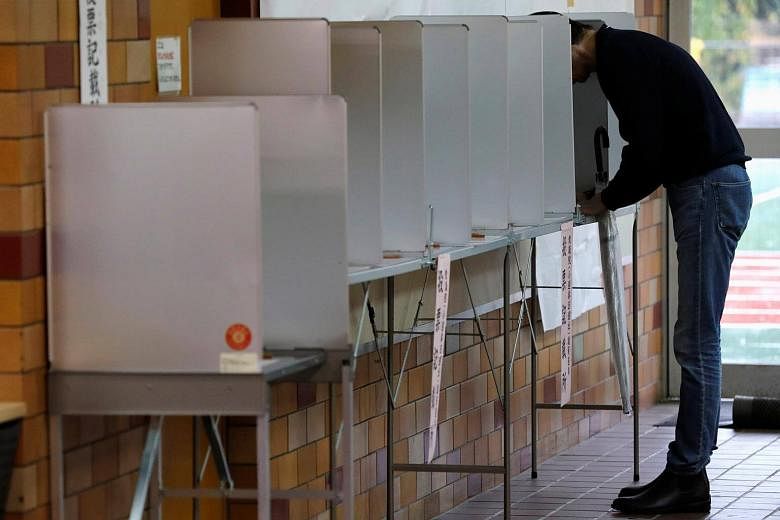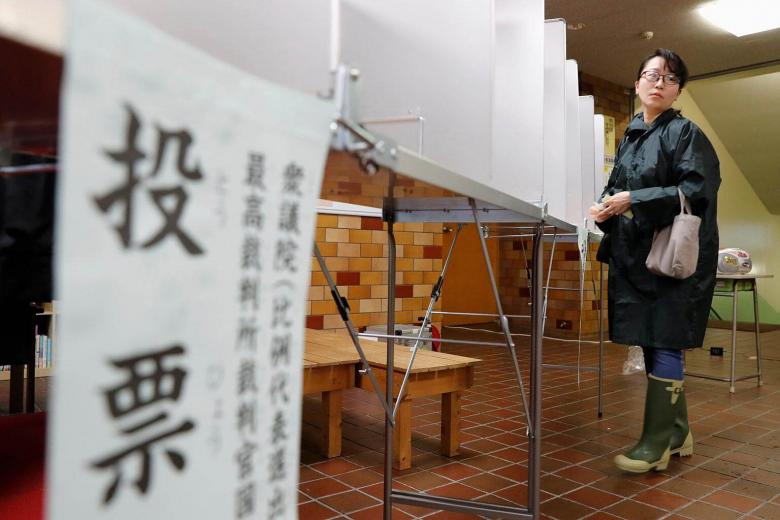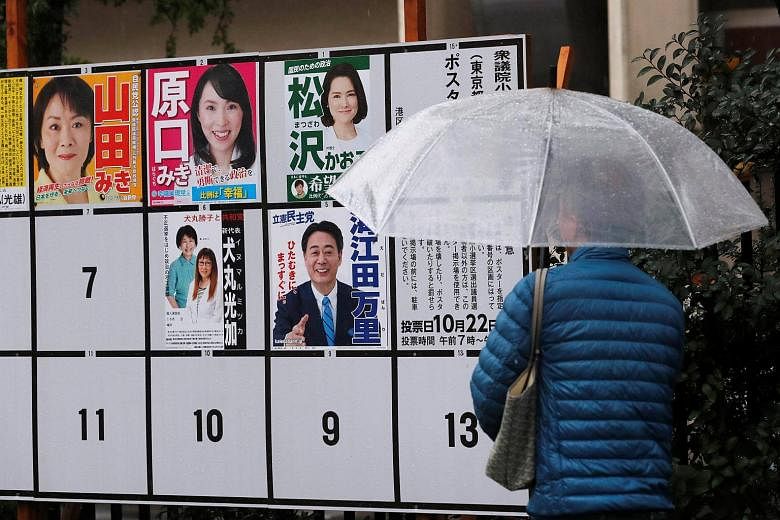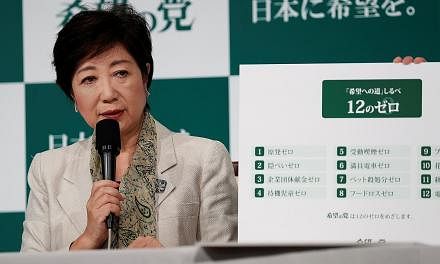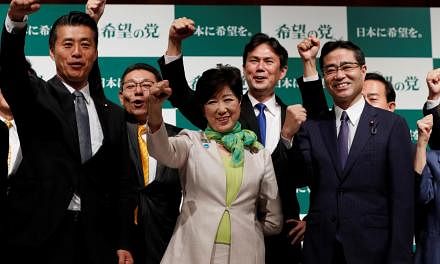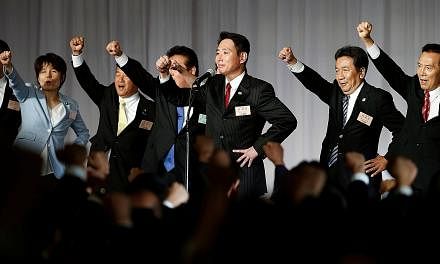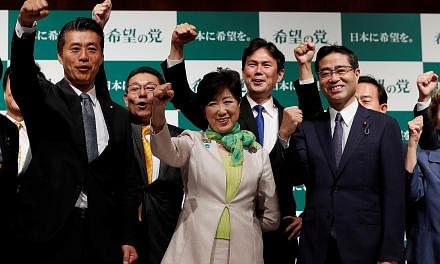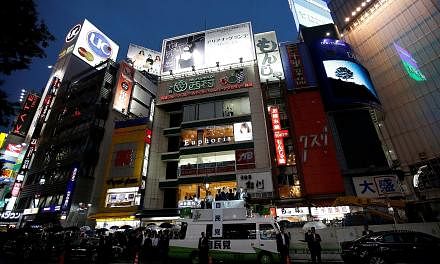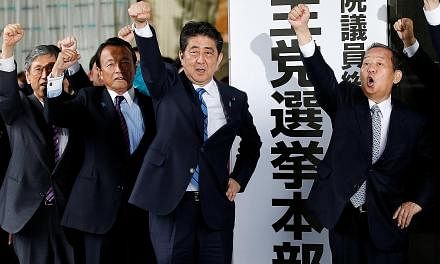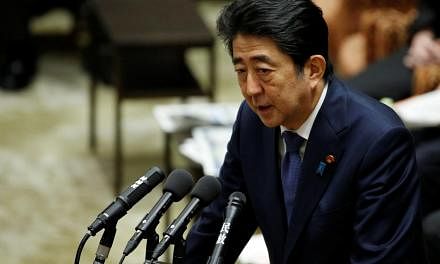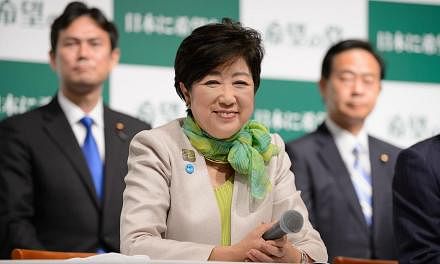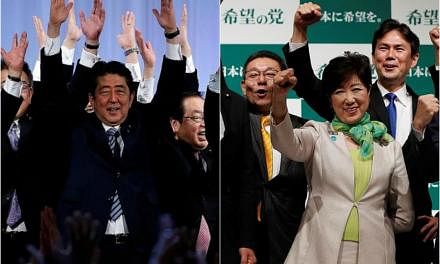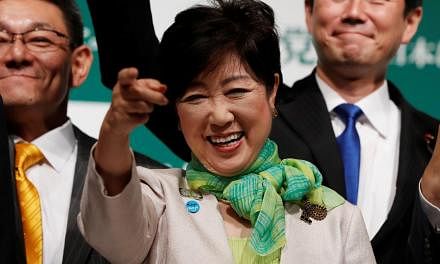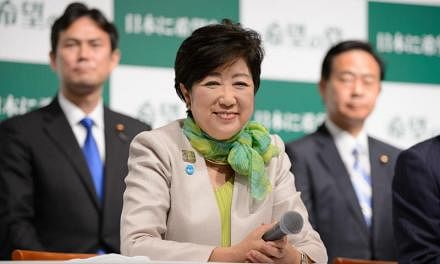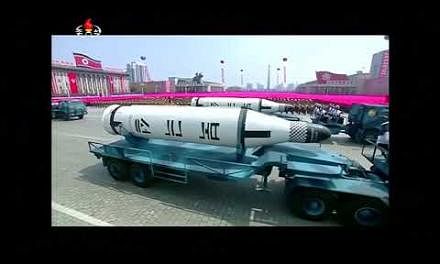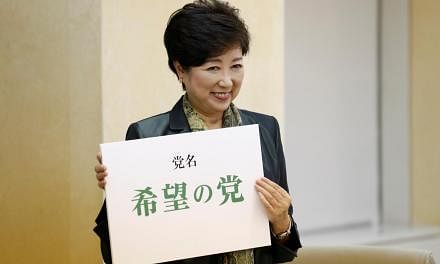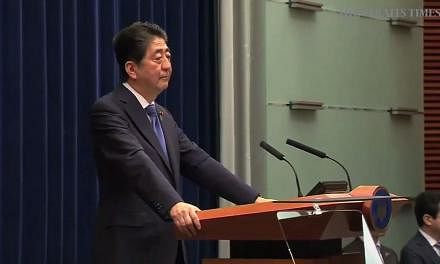TOKYO - Millions of Japanese citizens on Sunday (Oct 22) braved heavy rain and wind to vote in a snap election which is expected to return Prime Minister Shinzo Abe to power with a comfortable majority.
The polls, which see nearly 1,200 candidates vie for 465 seats in Japan's more powerful Lower House, opened at 7am local time (8am Singapore time) and will close at 8pm (7pm Singapore time), with exit polls expected shortly after.
The election is taking place as Typhoon Lan makes landfall, unleashing high waves, landslides and floods in central and western Japan and forcing the cancellation of hundreds of flights and disrupting rail services.
Several polling stations in rural areas had to open later or close early due to bad weather. As of 6pm - an hour before voting closed - turnout excluding early voters stood at 29.99 per cent, down 4.99 percentage points from 2014. That election's overall turnout of 52.66 per cent was the lowest since World War II.
Analysts say that if the weather affects turnout, it is likely to benefit Mr Abe, whose conservative supporters are more determined to vote, Agence France-Presse reported.
"I support Abe's stance not to give in to North Korea's pressure," one voter, Yoshihisa Iemori, told AFP as he cast his ballot in Tokyo. "I'm focusing on this point for the election," said the 50-year-old construction firm owner.
Some regional election boards said on Sunday they are unlikely to start counting ballots until at least Monday due to disruption to public transportation, reported Kyodo news agency.
Mr Abe ordered his minister in charge of disasters to be ready to mobilise rescue and evacuation forces, including troops, Agence France-Presse reported. The storm was moving north-east and may hit Tokyo or surrounding regions Monday morning.
"In order to protect people's lives, the Abe Cabinet will unite and do its best to provide an emergency response to a disaster," he was quoted as telling told reporters.
Several local governments in Osaka and other prefectures issued evacuation advisories, urging residents living near the coast, rivers and hillsides to move to shelters.
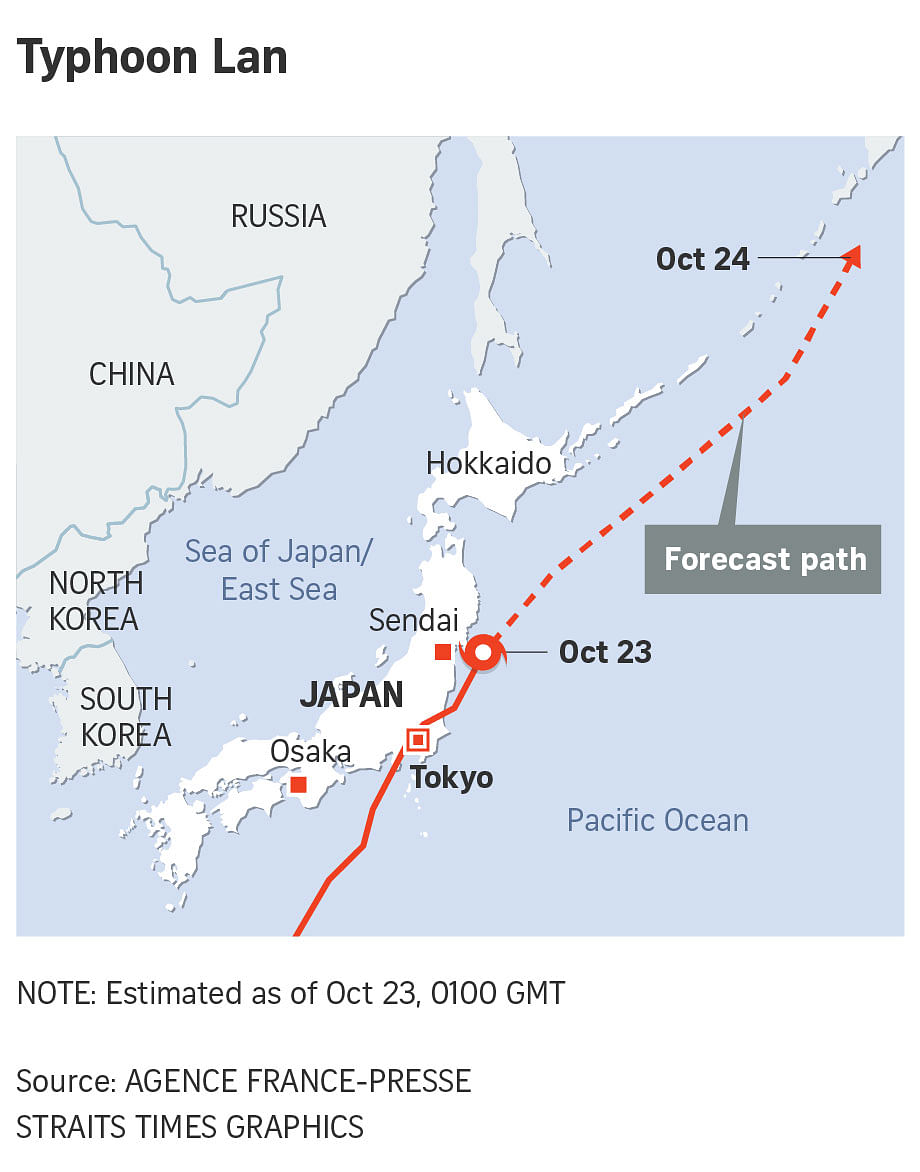
Voting was delayed by some 20 minutes in Kochi, western Japan, as landslides blocked a road, preventing election officials from arriving in time at a polling station, according to national broadcaster NHK.
Ferries to a remote island in the west were cancelled due to high waves, forcing election officials to suspend the counting of votes there.
Mr Abe, who called the election 14 months ahead of schedule, has said a snap election was necessary to get the mandate of voters on his ruling Liberal Democratic Party (LDP)'s plans to stave off what he refers to as "national crises" of the North Korea and demographic threats.
SURVEYS FLAG HUGE VICTORY FOR ABE
Yet the poll comes at a delicate time for the LDP, which has endured a bruising year of scandals. Earlier this year, Mr Abe was himself implicated in two cronyism scandals, while his protege Tomomi Inada resigned as defence minister over a major cover-up scandal.
Mr Abe's disapproval ratings still outstrip his support ratings in a slew of media polls, with a survey by NHK last week pegging approval at 39 per cent and disapproval at 42 per cent. Another by the Nikkei newspaper has support at 37 per cent and disapproval at 48 per cent.
Even so, media surveys have suggested that it is unlikely that Mr Abe will suffer the same fate as his British counterpart Theresa May, whose snap election gambit in June backfired and rendered her with a weaker hand in parliament.
The surveys show that the ruling coalition of the LDP and Komeito will score a huge victory as an opposition challenge mounted by Tokyo Governor Yuriko Koike fizzled out not long after she launched the Kibo no To (Party of Hope) last month (Sept).
What is uncertain, however, is whether the ruling bloc will retain its two-third "super majority" in the lower chamber of Parliament that is required to push forward Constitutional amendment. To do so, it will need to win at least 310 seats. In the last Lower House, the coalition held 324 seats, or 68.2 per cent of the chamber.
Media surveys expect the coalition to win anywhere between 290 and 320 seats.
In a tight race for the second place - and the title of being the main opposition in Parliament - are Ms Koike's Party of Hope and the Constitutional Democratic Party of Japan (CDP).
Both parties have taken in members of what was formerly the main opposition party, the Democratic Party (DP). In power from 2009 to 2012, the DP has in recent years been plagued by very public spats.
LDP RIVAL FIZZLES OUT
The Kibo no To, led by Tokyo Governor Yuriko Koike, has positioned itself as the "centrist reformist" alternative to the LDP although both parties are ideologically cut from the same cloth.
Ms Koike herself was a LDP member for over a decade, but defied the party to run for governorship last year. She quit the party to lead the local Tomin First no Kai (Tokyoites First) in July to a resounding win in the local Tokyo Metropolitan Assembly election.
The Party of Hope, which is fielding 235 candidates, has entered a loose alliance with the Osaka- based Nippon Ishin no Kai (Japan Innovation Party).
It started out strong, but hype surrounding the party quickly fizzled out after Ms Koike refused to throw her hat into the ring, leaving the party with no clear candidate for the prime minister role.
Party insiders say Ms Koike's vow to "eliminate" the left-leaning members of the DP from her party has hurt its chances and tainted its image among the eyes of voters. She had earlier struck a deal with DP chief Seiji Maehara to absorb all its members.
Political blue blood Shinjiro Koizumi, son of former premier Junichiro Koizumi and a rising star with the LDP, has said that Ms Koike was caught in a bind of "double irresponsibility" - she would be letting down Tokyo voters if she were to quit as governor just a year after taking office; she would be irresponsible to Party of Hope if she does not run as a candidate under its banner.
With both the LDP and Kibo no To leaning right, Japan's newest political party - the CDP - is quickly gaining ground among the left-leaning voters.
Public broadcaster NHK pegs CDP's support at 6.6 per cent - higher than Party of Hope's 5.4 per cent. A Sankei newspaper survey has also predicted that the CDP would get between 46 and 60 seats, up from an initial estimate of 30 seats.
Despite being less than three weeks old, the CDP is already Japan's most popular political party on Twitter, with 185,025 followers.
The LDP has 130,000 followers, while Kibo no To has a paltry 12,900. The CDP, led by former Chief Cabinet Secretary Yukio Edano, is fielding 78 candidates.
Mr Edano has won a back-handed compliment from the most unlikely of supporters - former Tokyo governor Shintaro Ishihara. Mr Ishihara, an ultra-nationalist, praised him for "remaining true to what he believes in".
"He looks to me like a real man," Mr Ishihara said, adding that Mr Edano was unlike the "many candidates who ran away and became turncoats".
University of Tokyo political watcher Yu Uchiyama said the breaking up of DP and the fragmented opposition has given the LDP additional momentum. And with more than three in 10 voters undecided days before the poll, undecided voters may hold considerable sway - if they show up to vote.
"There is so much ambiguity. Until as recently as last week, many of these floating voters were expected to vote for Kibo no To, but now their expectations towards Kibo no To is shrinking while the CDP is gaining momentum," he said.
"There will be some voters who will not make up their minds based on policies, but rather choose the freshest voices because they don't like the establishment."
EARLY VOTING
The inclement weather that plagued Japan on Sunday had driven early voting figures to a record high. The system allows people who cannot vote on Election Day to cast their votes between the day after Nomination Day, Oct 11, and the eve of the election.
A record 21.4 million people, or 20.1 percent of all eligible voters, voted in the 11 days ending Saturday (Oct 21). This figure surpasses the total 13.2 million early votes cast in the 2014 Lower House poll, which saw an overall low turnout of just 52.7 per cent.
News bulletins showed long queues at early voting booths in shopping malls and other convenient stations on Saturday. Waiting times at some stations were reportedly longer than 30 minutes, prompting several voters to turn away.



